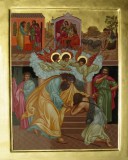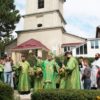
The two things we must know to be saved.
In the Name of the Father and the Son and the Holy Spirit, Amen. [1]
The Church gives us another example today, about repentance. It tells us another part of the story. This is the Sunday of the Prodigal Son, and is yet another Sunday that prepares us for the Great Fast. We are coming quickly upon it. Next week will be the Sunday of the Last Judgment, after which we stop eating meat, and after that is the Sunday of Forgiveness, and we then begin the fast, the following day.
The church has had something very important to say about repentance the past few Sundays, if you have been listening carefully. There have been three aspects of repentance that have been shown to us. One aspect is humility. We saw the publican [2] whom, in our mind’s eye, we may consider to be Zacchaeus [3], and we saw how his humility saved him. This was humility with knowledge, because with humility comes knowledge of God. Although he was humble and would not look up to heaven, he was still bold in his prayer to ask God for mercy, because he knew God would give him mercy.
The Sunday before, we saw Zacchaeus. We saw that he was a very bad man, but he changed. Repentance involves changing the way you live, the way you think. It also involves making restitution. It is not that restitution will save us. There is nothing that we can do to earn our salvation. Restitution is something that should come from deep within us. We should desire to make ourselves better in those things in which we have been lax. Whether our sin be depriving a man of his goods, as Zacchaeus did, or unclean thoughts, or any other sin, whether our sin be an internal sin, or an external one, or whether it has affected other people or affected no one except ourselves, we must desire and struggle to be better.
Now we see another aspect of repentance that is so important today, especially in light of what we are going to read and contemplate next week. That is, God receives a man’s repentance. This may seem to be an obvious statement, hardly worth making, but in actuality, many people do not really believe God will receive their repentance, or that they can truly change. We can see how marvelous God’s mercy is in this parable we have before us.
The father who has the two sons is God the Father. The younger of the two sons is humanity. The younger son is you and me. We should see ourselves in this younger son. What did he do? The father was getting old, and the son did not want to wait for him to die. He wanted his inheritance NOW. So he said, “Give me my inheritance now.” His father, who loved him, must have grieved over such a request, because he knew it would most probably be harmful to his son, and also he wished to have his son with him, but he gave in to him because of love.
God does the same thing with you and me. He gives us things that are good and precious, and we misuse and abuse them, but He gives them nonetheless. He causes the rains to fall on the evil and the good, and He even does much good to the evil, hoping that they will turn and repent. That’s what he did with the younger son, knowing what the son was going to do.
The son goes into a FAR country. There is sometimes much meaning in a single word. He went into a FAR country; it was far away, a land full of debauchery and uncleanness, FAR away from God, FAR away from salvation. And, indeed, if the man had died in such a state, he would have perished. He would have died far from God. But when he was in this far country, did he give any thought to God? No. He wasted his living with harlots, as his older son is so careful to point out later, and in debauchery and uncleanness of every kind. He had not thought whatsoever for his father, and how he had caused his father pain. He had no understanding how far away he was from salvation.
And that is how we are, too. Maybe not all of the time, but so much of the time what we do is so foolish, so stupid, and yet we do not see this or understand. We might live many, many years and not understand how evil the things we do are.
This son was the same as we are. He had no understanding of the evil he was doing and of the uncleanness and of how far away he was from God. And then the inevitable happened to him. He had wasted all of his living, and now began to be in want. He had no money, and was hungry and cold. He had to join himself to a citizen of the country who really did not care about him at all, and he was told to feed pigs. And this unclean food, which the pigs were eating, looked appetizing, because he was so hungry.
He began to be in want – what does this really mean?
It describes much more that the younger son’s penury. Humanity is in want. Remember that this younger son represents humanity – he represents you and me. Both the good and the evil that are in humanity are represented in this man, the debauchery, and also, the dignity of soul, later, when he repents.
When the son begins to be in want, he recognizes what his needs are. The unclean food, given him by the devil (for that is who the citizen of that far country is), cannot satisfy him, even though he is hungry for it. He looks back in his mind’s eye and he says: “I once lived with my father who loved me, and I had food and clothing and friends. And I was in an atmosphere of love and acceptance and affection. How could I have been so foolish to have left that all behind?” And he grieves and weeps bitterly over his misfortune.
But notice that he did not blame anyone for his situation. He did not blame his father for allowing him the inheritance, which, by the way, is something that a lot of people do with God. They blame Him for their sins. They do not understand how much God loves them and gives them all good things for their salvation. Instead, they blame Him if there is something wrong. “Why hasn’t God taken this sin away from me? I have been struggling with it for two months, two years. Why is this happening to me? Why don’t these people like me? Why do I have troubles here, troubles there?” Always blaming God.
By the way, as an aside, every single evening at Vespers, we pray that we not make “excuse with excuses in sins” [4]. This shows how prevalent this sin is, and how important the church thinks it is to fight it. This son did not make excuses. He recognized his want, and what was wrong with him.
Then he “came to himself”. This is a very hard thing to understand. A man cannot be saved unless he comes to himself. What does this mean?
We have spoken of it many times. In saving our souls, what two things must we know? One is to know God, and other is to know ourselves. The two are learned in parallel. If you learn only of God, you will be filled with pride, and your soul will be paralyzed. If you know only about your sins and your unworthiness and know little about God, you will be filled with despondency and fear, or escapism, and your soul will also be paralyzed, unable to do good. This latter sin is the more common one for Christians, I think.
Despondency is also very common and happens in each one of us to a greater or lesser degree. And if it happens in too great a degree, I tell you, you won’t be saved, because you won’t be able to do the things you need to do to learn of God. But if you learn of yourself and God at the same time, God will reveal Himself and self-knowledge also, within you. Then you will believe in the depths of your soul that you are a great sinner, but you will nonetheless say to yourself with confidence, “God will receive my repentance!’ and you will see the situation you are in, and you will want to be better, and you will know that you CAN become better!
I see this again and again, where people do not ACCEPT that they CAN change.
Sometimes, to be perfectly honest, people don’t want to change. They have an inkling, a desire, a little bit, to change. “I want to stop this sin. But I like this sin.” And they don’t have the gumption to make the effort. God even understands this!
This is why we have a “baseline” of things we must do as Christians – keeping the fasts, saying our prayers, coming to church – because without those things we would truly fall far away. But that is not enough, mind you, because a man must make an inner change. He must know of God and he must come to himself. And he must say exactly what the younger son said. He said, “I will arise and I will go to my father. I will make an effort. I will not only talk about my sins and lament about them and do nothing. I will arise and make a great effort.”
And then the son realized how far away he was. He was in a far country. And he still had to travel a long way, even until his father would see him, from a long way off. So that was a great struggle. That is what we must do. We pile sin upon sin in our soul. Everything that we pile onto our soul we must painstakingly take off, one brick at a time. So the more we pile on ourselves, the more difficult it is, and the further away we are, and the further we must travel back. But this younger son was great of soul, because he struggled back.
What was his attitude? It was not absolutely correct, but his misunderstanding was corrected by his father later. He went and said ” I will go to my father and say I have sinned against heaven and earth, and I am not worthy to be called your son”. So far, he is absolutely correct. But then he said, “Make me as one of thy hired servants,” and God will not do that! That’s not our God! He will make us friends! [5] This son, as he was walking back to his father, did not understand this. But we can understand, because we have the perspective of history and the Holy Scriptures to tell us: God will not make us as hired servants! Jesus Christ said He would make us friends. “I will call you friends, and there are many mansions in my father’s house.” [6] So we will not be hired servants. We will have everything that our Father has available for us!
And this is the meaning when the father saw his son and ran out to him. Can you imagine this meeting? The son is bedraggled and poor, starving, faint both of heart and of body, and the father comes to him and embraces him and kisses him. He puts the ring on his finger, a token of the father’s love and his authority; He kills the fatted calf, and makes merry because his son has come home. The son was only expecting to stay in the shack with the hired hands, and maybe to have a little bit of meat once in a while and his father gave him back EVERYTHNG that he had lost, and more than he had lost. That is what our Father will do for us.
The Church tells us about it right now, because we are now about to enter into a period of time when we had better think about our sins quite a bit. Next week we will talk about the Last Judgement, and it is terrifying what will happen in the Last Judgement for those who do not repent. But, if you only read that, and do not understand from today that the Father will accept your repentance, then you have lost the most important part of the story. This part is that God will accept you, if you arise, and go.
I will speak honestly here, that the major problem is that most people don’t want to “arise and go”. And therefore when they don’t arise and go, they cook up in their minds all kinds of ideas, about why they cannot stop a certain sin, or do better. And yet, they are not doing the things that God has laid out for them to do to bring them back to Him. If this fits any one of you, then may it be that you would understand the things that you must do, and that you would have a firmer resolve to arise and go.
A man cannot do something with full effort unless he believes it with full conviction. Our life is difficult. It is painful. And we have trouble fighting our sins, and some are so pleasurable that we have trouble wanting to fight them. The question is, “Why bother?” If we do not know what God will do for us, then we do not have the resolve to really, really attack our sins, and enter into the kingdom of heaven.
So the Church tells us what God will do. He shows us, as a loving Father, He will take us in His arms, and will put the ring upon our finger, which is His authority, you know, and His dignity, and His image. The ring has an image on it, doesn’t it? That is the image of God, which is within man. And He will kill the fatted calf, and we will feast sumptuously for all eternity.
But we’re not at that point yet because we’re still wearing flesh, and we’re still having difficulty with our sins. So, most of us are somewhere in that journey from the far country. And we must continue that journey. It is described with only a few words here in the Scriptures. He starts to journey, and then his Father comes upon him. Well … that’s not the way it really happened! He had to journey for quite some way before his Father saw him. He was quite a ways away, and he still had to travel a long way. Rectifying our life is like that. It takes a long time, and a lot of effort, but the Church tells us clearly what the effect of it will be, what the outcome will be. Keep this in your mind. It’s very important to remember these kinds of readings in the Scriptures because when you start to think of your sins, they will overwhelm you if you don’t realize the love of God. And next Sunday, and then the Sunday after that, and all the Sundays of Great Lent and all of the services of Great Lent, are full of recounting and remembering our sins and our unrighteousness and our wickedness.
It’s good to know those things; and remember them, because it keeps us from pride. But if you only learn those things, and you don’t know of God’s mercy, then you will fall away. Vast amounts of people that call themselves Christian have fallen away already, because they cannot understand the greatness of God in parallel with their wickedness. They either cast one away, or the other. They dumb down God, or they have exalted pride in themselves — one or the other. And you can see that many modern day heresies are because of these two things.
So, arise! Today, decide to arise. And when you fall down tomorrow, get up out of the dust and continue to walk. And if you cannot walk, then crawl, but keep going towards God. And if you have fixed in your mind what God has promised, then God will help you. And you will have the strength. No matter how weak you feel, you will have the strength to be saved. Amen.
Luke 15:11-32
And he said, A certain man had two sons: {12}And the younger of them said to his father, Father, give me the portion of goods that falleth to me. And he divided unto them his living. {13} And not many days after the younger son gathered all together, and took his journey into a far country, and there wasted his substance with riotous living. {14}And when he had spent all, there arose a mighty famine in that land; and he began to be in want. {15} And he went and joined himself to a citizen of that country; and he sent him into his fields to feed swine. {16} And he would fain have filled his belly with the husks that the swine did eat: and no man gave unto him. {17} And when he came to himself, he said, How many hired servants of my father’s have bread enough and to spare, and I perish with hunger! {18} I will arise and go to my father, and will say unto him, Father, I have sinned against heaven, and before thee, {19} And am no more worthy to be called thy son: make me as one of thy hired servants. {20} And he arose, and came to his father. But when he was yet a great way off, his father saw him, and had compassion, and ran, and fell on his neck, and kissed him. {21} And the son said unto him, Father, I have sinned against heaven, and in thy sight, and am no more worthy to be called thy son. {22} But the father said to his servants, Bring forth the best robe, and put it on him; and put a ring on his hand, and shoes on his feet: {23} And bring hither the fatted calf, and kill it; and let us eat, and be merry: {24} For this my son was dead, and is alive again; he was lost, and is found. And they began to be merry. {25} Now his elder son was in the field: and as he came and drew nigh to the house, he heard music and dancing. {26} And he called one of the servants, and asked what these things meant. {27} And he said unto him, Thy brother is come; and thy father hath killed the fatted calf, because he hath received him safe and sound. {28} And he was angry, and would not go in: therefore came his father out, and entreated him. {29} And he answering said to his father, Lo, these many years do I serve thee, neither transgressed I at any time thy commandment: and yet thou never gavest me a kid, that I might make merry with my friends: {30} But as soon as this thy son was come, which hath devoured thy living with harlots, thou hast killed for him the fatted calf. {31} And he said unto him, Son, thou art ever with me, and all that I have is thine. {32} It was meet that we should make merry, and be glad: for this thy brother was dead, and is alive again; and was lost, and is found.
[1] This homily was transcribed from one given in 1997, on the Sunday of the Prodigal Son. This Sunday is part of a five Sunday sequence that precedes Great Lent. There are some stylistic changes and minor corrections made and several footnotes have been added, but otherwise, it is essentially in a colloquial, “spoken” style.
It is hoped that something in these words will help and edify the reader, but a sermon read from a page cannot enlighten a soul as much as attendance and reverent worship at the Vigil service, which prepares the soul for the Holy Liturgy, and the hearing of the scriptures and the preaching of them in the context of the Holy Divine Liturgy. In such circumstances the soul is enlightened much more than when words are read on a page.
[2] Luke 18:10-14
[3] Luke 19:1-10
[4] This is sung at “Lord I have cried” in Vespers
[5] John 15:14-15
[6] John 14:2
 Memorial house of romanian elder Sofian Boghiu Consecrated in his native Village
Memorial house of romanian elder Sofian Boghiu Consecrated in his native Village  On the 14th Sunday after Pentecost, His Eminence Metropolitan Vladimir celebrated the Divine Liturgy in the St. Nicolas Monastery, Dobrusa village, Soldanesti region
On the 14th Sunday after Pentecost, His Eminence Metropolitan Vladimir celebrated the Divine Liturgy in the St. Nicolas Monastery, Dobrusa village, Soldanesti region  Inauguration of the volume of articles presented at the National Scientific Conference “The Orthodox Church and the State: Faith and Knowledge”
Inauguration of the volume of articles presented at the National Scientific Conference “The Orthodox Church and the State: Faith and Knowledge”  The 12th Sunday after Pentecost – kindness in God changes the world we live in
The 12th Sunday after Pentecost – kindness in God changes the world we live in  The 11th Sunday after Pentecost – loving our God and our neighbor
The 11th Sunday after Pentecost – loving our God and our neighbor  The Transfiguration of the Lord, celebrated in the Nativity of the Lord Cathedral in Chisinau
The Transfiguration of the Lord, celebrated in the Nativity of the Lord Cathedral in Chisinau  His Eminence Metropolitan Vladimir celebrates 65th anniversary
His Eminence Metropolitan Vladimir celebrates 65th anniversary  Divine Service at the St. Theodore of Tyre Monastery (Ciuflea) in Chisinau, and congratulation of Archimandrite Nicolae (Rosca), the Monastery’s confessor-administrator, on the 50th anniversary.
Divine Service at the St. Theodore of Tyre Monastery (Ciuflea) in Chisinau, and congratulation of Archimandrite Nicolae (Rosca), the Monastery’s confessor-administrator, on the 50th anniversary.  The Tenth Sunday after Pentecost: Divine Liturgy in the Nativity of the Lord Cathedral in Chisinau
The Tenth Sunday after Pentecost: Divine Liturgy in the Nativity of the Lord Cathedral in Chisinau 


